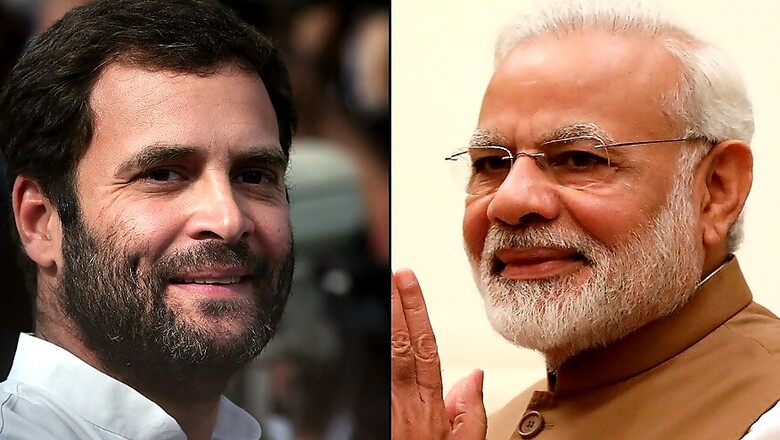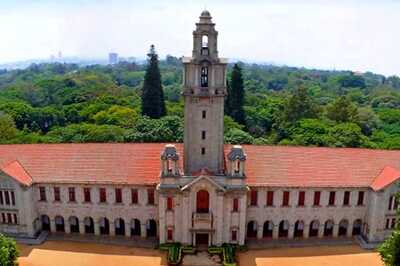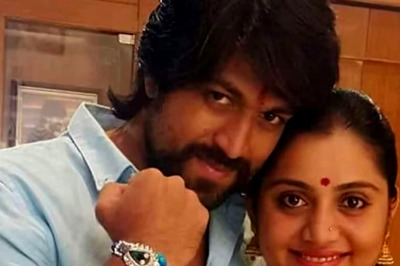
views
New Delhi: In an announcement that is being considered a mega game-changer in the run-up to the 2019 election, Congress president Rahul Gandhi, while addressing a farmer rally in Raipur on Monday, said that his party will implement minimum income guarantee for the poor if Congress comes to power in 2019.
While the scheme was being contemplated in the power corridors of the national capital after the economic survey of 2017 introduced the topic and experts were hoping for a roll-out in the upcoming Budget, Rahul Gandhi clinched the first mover’s advantage months ahead of the 2019 Lok Sabha polls.
What is minimum income guarantee?
In developing countries, the unconditional direct cash transfer scheme is looked at as a poverty alleviation programme. The cash is directly deposited in the beneficiaries' bank account.
The beneficiaries will, at the max, only be required to have a bank account and show residence proof to receive the benefits. For the beneficiaries of the Indian pilot, they were required to have bank accounts.
Since it is a measure to eradicate poverty, the minimum income guarantee in India will not be universal, i.e., be provided to all. If implemented, the Lower Income Groups (LIGs) are likely to be the beneficiaries.
Another reason why it is considered for developing countries is the belief that technology will take over jobs.
When was the concept of minimum income guarantee introduced in India?
The concept, even if not implemented nationally in India, has been discussed in details by both the BJP and the Congress on the floor of the Parliament.
The Economic Survey 2016-2017 brought to light that Universal Basic Income (UBI) or minimum income guarantee is feasible for India and that it can replace all existing social welfare schemes.
The last Economic Survey of 2018 also pointed at the possibility of implementing the social welfare scheme in at least one or two states in the near future.
Has the scheme been tried in India before?
Minimum income guarantee pilots in India, funded by the UNICEF, operated in the villages of Madhya Pradesh from 2011-2012. Two pilots were simultaneously conducted, one was running in nine villages and the other was in two tribal villages, testing if how it will pan out in these villages.
The first pilot, Madhya Pradesh Unconditional Cash Transfer (MPUCT), funded 6,000 individuals in eight villages for 12 to 17 months. Against the eight villages receiving the UCTs, 12 similar villages were not receiving the cash transfer. When the pilot first started in the eight villages, for a year, each adult received Rs 200 and each child received Rs 100 every month. After this period, the cash amount increased to Rs 300 for every adult and Rs 150 for every child.
The second pilot was conducted in two tribal villages, where one village received UCTs and the other did not. For the tribal village that was receiving the benefit, the amounts were Rs 300 for each adult and Rs 150 for each child in a month.
The pilot results were positive. The results showed that the beneficiaries began to save more and use the money wisely. Beneficiaries were using the funds to improve their standard of living - increasing their household expenditure, funding their children's education, among others.
Does the scheme have any negative impact?
Although the results were positive, any government can implement this scheme only on the condition that the existing social welfare schemes are foregone.
Due to these implementation issues, even though the pilot showed positive results, experts pointed out that it is necessary for India to first correct the basic issues like correcting the poverty line to successfully implement UBI.
In an interview to News18, former chief economic adviser, Arvind Subramanian, while discussing that minimum income guarantee takes away the incentive to work, said, "I am not clear if there is evidence for that argument. There is a little bit of paternalism in that argument. I mean if you're really poor which is what this addresses, are we sure that getting people from having very little to upto the poverty line is going to make them stop working? I mean, maybe it happens I have to see the evidence but it seems to me that we have no right to even ask that question. Leave it to them to say as to what they want to do. So I think this is fair argument but we have to be careful about the implementation."
Was BJP contemplating a roll-out as well?
News18 had earlier reported that stung by the defeats in three crucial states in the Hindi heartland and facing anger over an ongoing agricultural distress, the BJP was likely to announce the Universal Basic Income in its interim budget.
The loss of Rajasthan, Chhattisgarh and Madhya Pradesh to the Congress is inevitably going to loom large over the forthcoming interim budget. Officials said that a pro-poor budget that appeals to the rural poor and deals with the agrarian crisis is likely.
“The government is seriously considering the announcement of the Universal Basic Income to help pull people out of poverty," said one official.
What does the Economic Survey tell about minimum income guarantee?
A 40-page chapter, called Universal Basic Income: A Conversation With and Within the Mahatma, included in the economic survey of 2017 outlined the UBI in three components — universality, unconditionality, and agency (by providing support in the form of cash transfers to respect, not dictate, recipients’ choices).




















Comments
0 comment